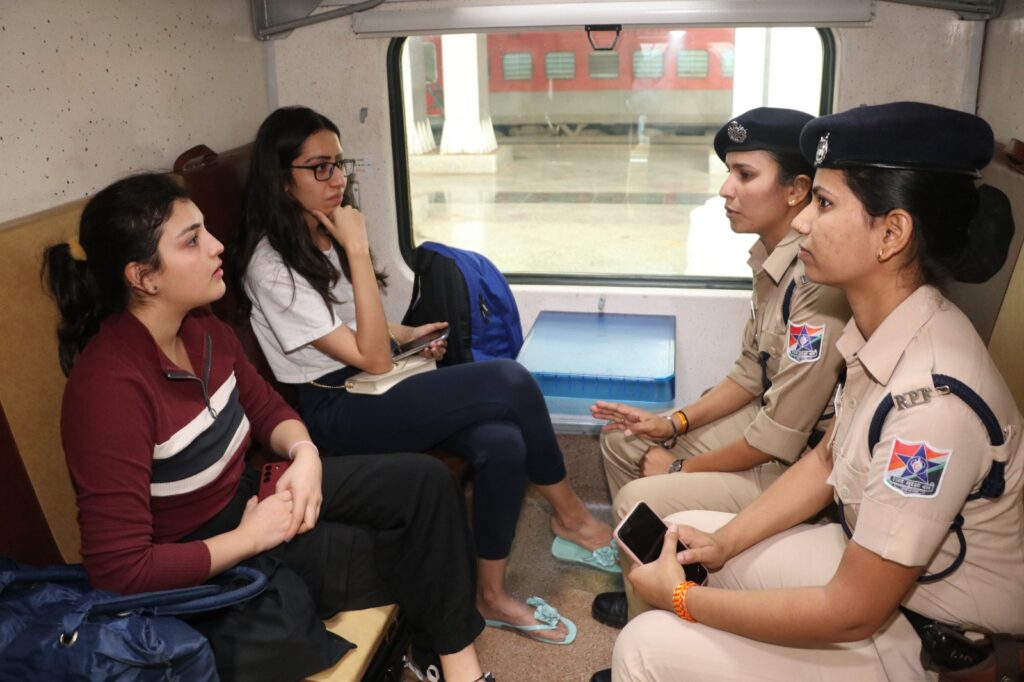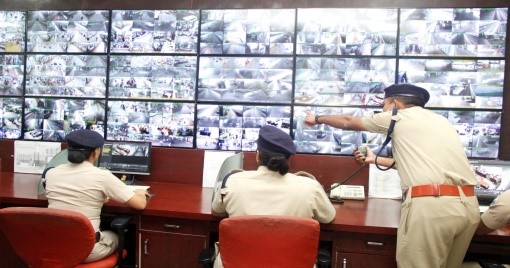Enhancing Security in Suburban Railway Networks: Innovations and Challenges

Ajoy Sadany, IG cum PCSC/RPF/Western Railway
Mumbai, Suburban railway systems, often referred to as the lifeline of metropolitan cities, serve millions of passengers daily and form the backbone of urban connectivity. However, the vast scale and complexity of these networks pose significant safety and security challenges. For instance, the Mumbai suburban railway network, one of the busiest in the world, carries over 7 million passengers daily, making its security operations highly demanding. At the forefront of addressing these issues is the Railway Protection Force (RPF), a specialized unit committed to ensuring the safety of passengers and railway infrastructure. While the challenges are substantial, the RPF’s innovative strategies and adoption of advanced technologies have made commendable progress toward enhancing security for our suburban commuters.
The primary challenge lies in the sheer density of the suburban railway system. Mumbai’s suburban railway network carries nearly 35 lakh passengers over Western Railway and more than 37 lakh passengers over Central Railway on a daily basis. This level of activity creates an environment where overcrowding is inevitable, particularly during peak hours. Overcrowded trains and congested platforms are not just inconvenient; they create fertile ground for petty crimes such as pickpocketing, chain snatching, and harassment. Additionally, incidents involving “fatka” gangs, who exploit slow-moving trains to snatch passengers’ valuables, further exacerbate the problem, often leading to injuries or fatalities as passengers fall from moving trains.
For female commuters, the risks are heightened. Overcrowded conditions, even in women-only coaches, frequently lead to instances of harassment, pickpocketing, and emotional distress. Ensuring their safety requires not only vigilant monitoring but also a systemic effort to address the broader issues of overcrowding and inadequate space. In 2024, more than 13,000 offenders travelling in ladies’ coaches were apprehended & fines amounting to over Rs. 29 lakh have been realised over Mumbai Suburban section.
Another pressing concern is the persistent threat of terrorism. Suburban railway systems are vulnerable due to their open access and high passenger volumes. The 2006 Mumbai train bombings serve as a grim reminder of the catastrophic potential of such attacks. The evolving nature of crime in the digital age further complicates the matter. Cyber-attacks targeting ticketing systems, the misuse of social media to incite violence, and the introduction of sophisticated weaponry all demand dynamic and multifaceted security responses. Trespassing and untoward incidents represent another significant challenge. In urban areas where railway tracks intersect residential zones, many individuals resort to crossing tracks or entering restricted zones. This behaviour not only disrupts operations but also leads to tragic fatalities. In 2024, more than 3500 untoward cases (deaths and injury) were reported.
Railway security is not solely the responsibility of the RPF. The force collaborates with local police, intelligence agencies, anti-terrorism squads, and other law enforcement organizations. However, gaps in communication and the absence of streamlined protocols between these agencies often impede prompt responses to security threats. In rapidly evolving situations, such as terrorist attacks or criminal incidents, delays in coordination can significantly worsen the situation.
Despite these challenges, the RPF has introduced several innovative measures to enhance security. Advanced technology plays a crucial role in these efforts. The installation of Closed-Circuit Television (CCTV) cameras at stations and in trains has significantly bolstered surveillance capabilities. These systems, integrated with real-time monitoring, enable the RPF to detect and respond to suspicious activities promptly. Over Mumbai Suburban section, total 1924 cases detected and 1955 offenders were apprehended by RPF in the year 2024, out of which 424 cases have been detected with help of CCTV in which 438 offenders were apprehended. Facial recognition technology, powered by artificial intelligence, further enhances security by allowing real-time identification of known offenders and missing persons. In 2024, 31 offenders were apprehended with the help of FRS in 29 separate cases over Mumbai Suburban section by RPF.
Digital tools have also empowered passengers to play a more active role in their own safety. To combat fraud and reduce congestion, many suburban rail networks have adopted smart ticketing systems. These include digital ticketing, e-payment systems, and contactless cards, which reduce the need for physical ticket counters and limit opportunities for criminal activities related to ticketing. In addition, drones have been deployed to monitor large crowds and hard-to-reach areas, providing a broader and more comprehensive security perspective. Platforms such as the “Railway Helpline” (139) and the “Rail Madad App” allow commuters to report incidents directly, ensuring faster responses and fostering a stronger connection between passengers and authorities.
The RPF has implemented several measures to enhance railway security. Specialized Anti-Theft Squads operate in plainclothes to blend with passengers, enabling them to identify and apprehend criminals effectively, which has significantly reduced theft cases across suburban networks. Utilizing big data analytics, the RPF has adopted data-driven policing to identify crime-prone areas and times, allowing for more efficient resource allocation and targeted security measures. Additionally, Integrated Security Systems (ISS) have been deployed at sensitive and vulnerable railway stations, incorporating electronic surveillance, access control, and other advanced security features to improve overall safety.
The RPF has also launched several focused operations to address specific security issues. Operation Yatri Suraksha targets crimes such as theft and robbery through regular patrols and undercover personnel. Passengers often leave behind their belongings in a rush to catch trains or disembark. Through Operation Amanat, RPF actively locates such lost items and ensures those are returned to their rightful owners. In 2024, passenger belongings valued over Rs. 6.67 Cr were returned to approx. 2200 rightful owners. Operation Jeevan Raksha highlights the RPF’s commitment to passenger welfare, with personnel saving lives by rescuing individuals in imminent danger of falling under moving trains. In 2024, 42 lives were saved in Mumbai Suburban section by the selfless acts of RPF personnel. Similarly, Operation Nanhe Faristey focuses on safeguarding vulnerable children found in railway premises, providing them with immediate care and protection. Under this operation, 587 children were rescued with follow up action in coordination with CWCs and NGOs in Mumbai suburban section in 2024.
Efforts to enhance women’s safety include initiatives like “Meri Saheli,” where RPF personnel engage directly with female commuters to ensure their security. Dedicated squads and WhatsApp groups connect female passengers with female RPF staff, enabling real-time responses to safety concerns. Besides this, under Mission Matra Shakti, RPF assists pregnant lady passengers traveling in trains or at stations. Eight pregnant ladies were assisted by RPF in Mumbai Suburban section in 2024. This initiative highlights RPF’s dedication to maternal care and passenger well-being. While Missin Sewa aims to extend a helping hand to passengers in need, including the elderly, women, differently-abled passengers and those who are sick or injured. Additionally, Operation Aahat addresses human trafficking, with the RPF collaborating with NGOs and law enforcement agencies to rescue victims and apprehend offenders.
The RPF has embraced community policing as a key component of its suburban railway security strategy, fostering a sense of collective responsibility by actively engaging local communities and station staff. Initiatives such as regular meetings with residents and collaborative security measures have strengthened this approach.

Photo: Shri Manoj Yadava, IPS, Director General of RPF with the team of RPF marathoners at the Mumbai Marathon 2025 held recently.
In a unique effort to raise awareness, the RPF participated in the Mumbai Marathon 2025, where Shri Manoj Yadava, IPS, DG RPF, led a contingent of 50 male and female officials. Running alongside marathoners, they promoted fitness and spread critical messages about avoiding trespassing, the importance of safety over shortcuts, and sensitivity toward women’s security.
Looking ahead, the RPF has identified key areas for improvement to address the evolving challenges of suburban railway security. Infrastructure upgrades, such as expanding CCTV coverage and advanced crowd management solutions, including AI-powered monitoring, can help alleviate peak-time congestion and ensure passenger safety, are critical. Regular training programs will ensure that RPF personnel are equipped to handle emerging threats, including cyber security challenges and the use of advanced technologies. Increasing the deployment of women personnel at stations and on trains will enhance security for female passengers, while public awareness campaigns will encourage a zero-tolerance attitude towards crimes like harassment.
The RPF’s unwavering commitment to innovation and collaboration underscores its dedication to making suburban railways a safer mode of transport. By addressing systemic issues, leveraging technology, and fostering public cooperation, the force is paving the way for a more secure and efficient suburban railway network. As millions rely on these systems daily, the RPF’s efforts remain essential in ensuring their safety and confidence in this vital lifeline of urban connectivity.




